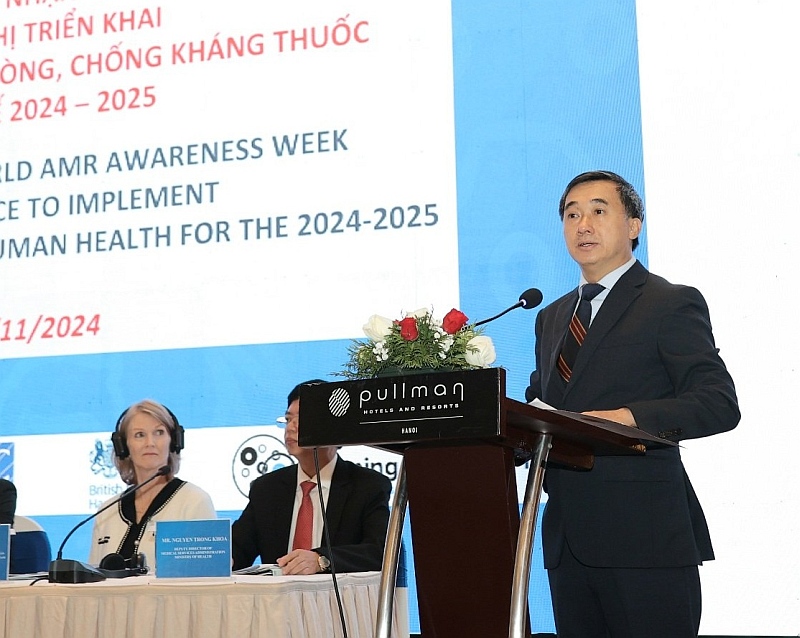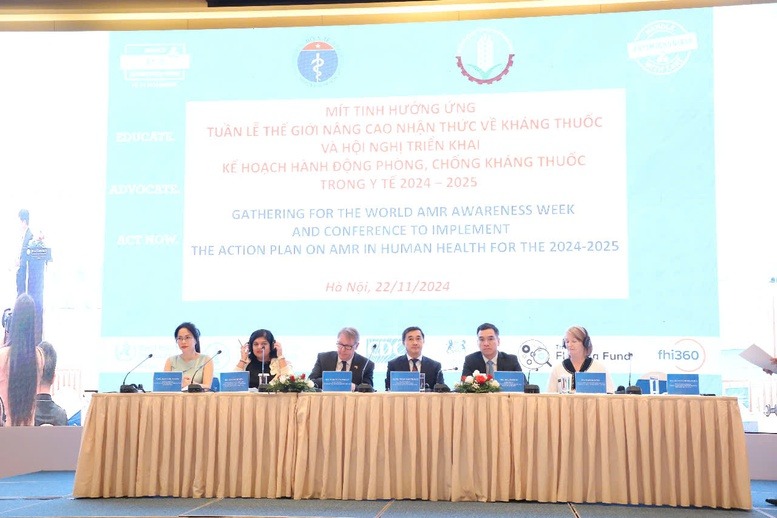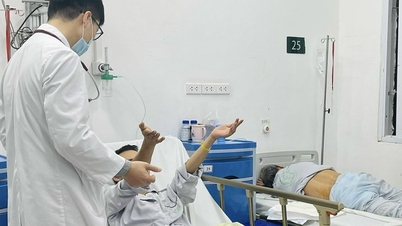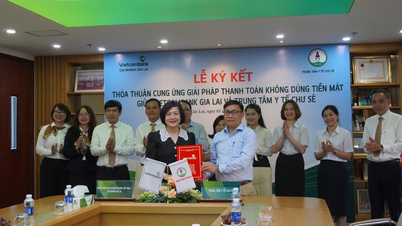The Ministry of Health coordinated with the World Health Organization (WHO) to organize a rally in response to the "World Antimicrobial Resistance Awareness Week" and a conference to deploy the Action Plan on Antimicrobial Resistance Prevention and Control in the Health Sector for the period 2024-2025.
The Ministry of Health coordinated with the World Health Organization (WHO) to organize a rally in response to the "World Antimicrobial Resistance Awareness Week" and a conference to deploy the Action Plan on Antimicrobial Resistance Prevention and Control in the Health Sector for the period 2024-2025.
This year, WHO has chosen the theme “ Educate , Mobilize, Act Now”, aiming to accelerate efforts to raise awareness and action to tackle the growing threat of antimicrobial resistance.
Speaking at the Rally in response to the “World Antimicrobial Resistance Awareness Week” today, Deputy Minister of Health Tran Van Thuan said that antimicrobial resistance is currently a serious threat to public health and sustainable development. WHO has ranked antimicrobial resistance among the top 10 threats to global public health.
 |
| Deputy Minister of Health Tran Van Thuan spoke at the Conference. |
Antimicrobial resistance not only affects all areas of health but also has far-reaching impacts on the entire society, transcending national boundaries.
Antimicrobial resistance occurs when bacteria, viruses, fungi, and parasites no longer respond to antimicrobial drugs. As a result, antibiotics and other drugs become ineffective and infections become difficult or impossible to treat, increasing the risk of disease spread, serious illness, and death.
In Vietnam, antibiotic resistance has become a major public health concern. According to recent antibiotic resistance surveillance results, high rates of antibiotic resistance have been recorded in common bacteria, especially in hospitals.
According to statistics, 1/4 of inpatients are reported to use antibiotics inappropriately. The misuse and abuse of antibiotics in medicine and agriculture are the main causes of antibiotic resistance.
The Global Antimicrobial Use and Resistance Surveillance System (GLASS) 2022 report shows alarming rates of resistance among common bacterial pathogens.
The reported average rates in 76 countries of 42% for E. coli resistance to third-generation cephalosporins and 35% for methicillin-resistant Staphylococcus aureus are of major concern.
For urinary tract infections caused by E. coli, 1 in 5 cases had decreased susceptibility to standard antibiotics such as ampicillin, co-trimoxazole, and fluoroquinolones in 2020. This makes it more difficult to effectively treat common infections.
Rising levels of resistance are likely to lead to increased use of last-resort drugs such as carbapenems. As the effectiveness of these last-resort drugs declines, the risk of untreatable infections increases.
Projections from the Organisation for Economic Co-operation and Development (OECD) indicate that antibiotic resistance will eventually double by 2035, compared with 2005 levels, highlighting the urgent need for strong antibiotic stewardship measures and increased surveillance coverage worldwide.
Deputy Minister Tran Van Thuan said that in Vietnam, in 2023, the National Strategy on Antimicrobial Resistance Prevention and Control for the period 2023-2030, with a vision to 2045, was approved by the Prime Minister. The Ministry of Health issued an Action Plan on Antimicrobial Resistance Prevention and Control in Healthcare for the period 2024-2025 with four important goals.
To achieve these goals, the health sector and local authorities need to mobilize and support finance and resources to implement the plan, improve the quality of human resource training, and provide detailed and easy-to-apply guidance documents for health facilities.
 |
| Representatives of the Ministry of Health and international organizations attended the rally. |
In addition, multi-sectoral coordination between health, agriculture, environment and relevant agencies is a key factor to ensure the successful implementation of national plans and strategies.
"Only when all sectors and communities work together can we effectively control antibiotic resistance, contributing to protecting public health and sustainable development," the Deputy Minister of Health emphasized.
On the international side, Ms. Erin Kenny, Head of the WHO's Universal Health Care Team, said that in the health sector, drug resistance threatens many achievements of modern medicine. It makes infections harder to treat and makes other medical procedures and treatments such as surgery, caesarean sections and cancer chemotherapy more risky.
Antimicrobial resistance also imposes a huge cost burden on both the health system and the economy, for example by increasing the need for more intensive and costly care, affecting the productivity of patients or caregivers through prolonged hospital stays, and harming agricultural productivity.
At the rally, Dr. Ha Anh Duc, Director of the Department of Medical Examination and Treatment Management, Ministry of Health, called on the entire health sector in all provinces and cities to implement the National Strategy and Action Plan on Antimicrobial Resistance in Health to protect the health of current people and the health of future generations, and to protect valuable antibiotic resources in Vietnam and around the world.
Source: https://baodautu.vn/khang-thuoc-dang-la-moi-de-doa-suc-khoe-toan-cau-d230686.html
































































































Comment (0)